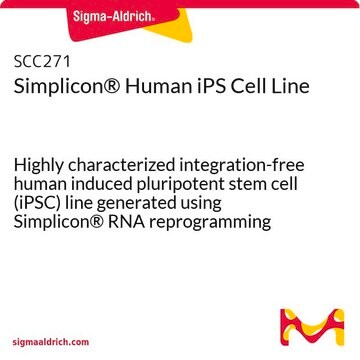SCC487
CNS-1 Rat Glioma Cell Line
Rat
Se connecterpour consulter vos tarifs contractuels et ceux de votre entreprise/organisme
About This Item
Code UNSPSC :
41106514
Nomenclature NACRES :
NA.81
Produits recommandés
Nom du produit
CNS-1 Rat Glioma Cell Line,
Source biologique
rat
Niveau de qualité
Conditionnement
vial of ≥1X10⁶ cells/vial mg
Fabricant/nom de marque
Millipore
Mode de croissance
N/A
Technique(s)
cell analysis: suitable
Conditions d'expédition
liquid nitrogen
Température de stockage
−196°C
Application
Each vial contains ≥1X10⁶ viable cells.Cells are tested negative for infectious diseases by a Rat/Mouse Essential CLEAR Panel by Charles River Animal Diagnostic Services.Cells are verified to be of rat origin and negative for inter-species contamination from mouse, human, Chinese hamster, Golden Syrian hamster, and Non-human Primate (NHP) as assessed by a Contamination Clear panel by Charles River Animal Diagnostic ServicesCells are negative for mycoplasma contamination.
Glioma is one of the most common brain tumors and is highly aggressive and resistant to standard treatments. Immunotherapy is one of the more promising treatment options since the discovery of lymphatics in the central nervous system allows for penetration of the blood-brain barrier (1). Cellular models that both recapitulate in vivo characteristics of gliomas and are amenable to immunotherapeutic modalities are thus of great value in advancing understanding of gliomas and their potential treatment.The CNS-1 rat glioma cell line is a well-established model that closely mimics the invasive behavior and growth characteristics of human gliomas (2). CNS-1 cells are derived from an N-nitroso-N-methylurea-induced intracranial tumor of a male Lewis rat and are histocompatible with this inbred rat strain, facilitating a range of in vivo studies. Tumors derived from injection of CNS-1 cells display diffuse infiltrative patterns similar to human glioblastoma multiforme (2,3). CNS-1 cells are positive for glial fibrillary acid protein (GFAP), retinoic acid receptor α, and neural cell adhesion molecule NCAM-140 (2,4). CNS-1 cells exhibit multiple chromosome loss and rearrangements reflecting genetic instability common in many human gliomas (2). CNS-1 rat glioma cells are a highly relevant model with wide applications for glioma immunotherapies.CNS-1 cell line originated from an N-nitroso-N-methylurea-induced intracranial tumor of a male Lewis rat (1). 1. Cancer Lett 2020, 476: 1-12.2. J Neurooncol 1994, 22(3): 191-200.3. J Neurooncol 2009, 94(3): 299-312.4. Cancer Res 1998, 58(9): 2020-2028.
Caractéristiques et avantages
CNS-1 rat glioma cells are a highly relevant model with wide applications for glioma immunotherapies.
Stockage et stabilité
Store in liquid nitrogen. The cells can be cultured for at least 10 passages after initial thawing without significantly affecting the cell marker expression and functionality.
Autres remarques
This product is intended for sale and sold solely to academic institutions for internal academic research use per the terms of the “Academic Use Agreement” as detailed in the product documentation. For information regarding any other use, please contact licensing@emdmillipore.com.
Clause de non-responsabilité
Unless otherwise stated in our catalog or other company documentation accompanying the product(s), our products are intended for research use only and are not to be used for any other purpose, which includes but is not limited to, unauthorized commercial uses, in vitro diagnostic uses, ex vivo or in vivo therapeutic uses or any type of consumption or application to humans or animals.
Produit(s) apparenté(s)
Réf. du produit
Description
Tarif
Code de la classe de stockage
10 - Combustible liquids
Classe de danger pour l'eau (WGK)
WGK 2
Point d'éclair (°F)
Not applicable
Point d'éclair (°C)
Not applicable
Certificats d'analyse (COA)
Recherchez un Certificats d'analyse (COA) en saisissant le numéro de lot du produit. Les numéros de lot figurent sur l'étiquette du produit après les mots "Lot" ou "Batch".
Déjà en possession de ce produit ?
Retrouvez la documentation relative aux produits que vous avez récemment achetés dans la Bibliothèque de documents.
Notre équipe de scientifiques dispose d'une expérience dans tous les secteurs de la recherche, notamment en sciences de la vie, science des matériaux, synthèse chimique, chromatographie, analyse et dans de nombreux autres domaines..
Contacter notre Service technique








